#helen vasallo
Link
The 2020 Warwick Prize for Women in Translation, judged by Amanda Hopkinson, Boyd Tonkin and Susan Bassnett, was awarded to The Eighth Life (for Brilka) by Nino Haratischvili, translated from German by Charlotte Collins and Ruth Martin, during an online event held on Thursday 26 November.
On her Translating Women blog Helen Vasallo gives a thumbs-up to the winner: “This multi-generational story of revolution and downfall strikes a endnote of possibility and new chances....I cannot recommend this extraordinary book highly enough, and I hope you will read it and love it as I did.” Read Helen’s rave review here.
The event was capped by readings from all the shortlisted titles, beginning at 00:26:00 (not to be missed: Lissie Jacquette reading from Thirteen Months of Sunrise with her week-old baby at 00:45:38):
Abigail by Magda Szabó, translated from Hungarian by Len Rix (MacLehose Press, 2020)
Happiness, As Such by Natalia Ginzburg, translated from Italian by Minna Zallmann Proctor (Daunt Books Publishing, 2019)
Lake Like a Mirror by Ho Sok Fong, translated from Chinese by Natascha Bruce (Granta Publications, 2019)
Letters from Tove by Tove Jansson, edited by Boel Westin & Helen Svensson, translated from Swedish by Sarah Death (Sort of Books, 2019)
The Eighth Life by Nino Haratischvili, translated from German by Charlotte Collins and Ruth Martin (Scribe UK, 2019)
Thirteen Months of Sunrise by Rania Mamoun, translated from Arabic by Elisabeth Jaquette (Comma Press, 2019)
White Horse by Yan Ge, translated from Chinese by Nicky Harman (HopeRoad, 2019)
Congratulations to the prizewinning author and translators!
#warwick prize for women in translation#nino haratischvili#charlotte collins#ruth martin#chantal wright#amanda hopkinson#boyd tonkin#helen vasallo#elizabeth jacquette
4 notes
·
View notes
Text
#WiT Goes to Senate House, London: Notes from the “Translating Women” Conference 31 Oct. - 1 Nov. 2019
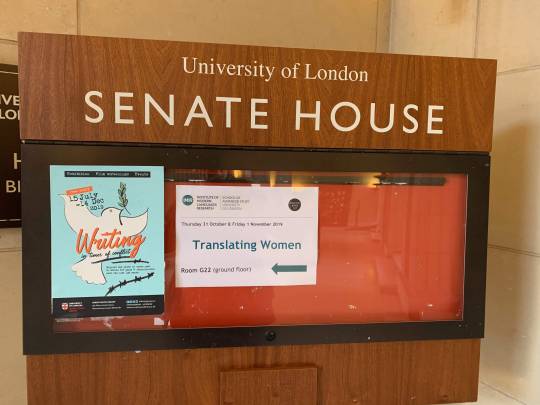
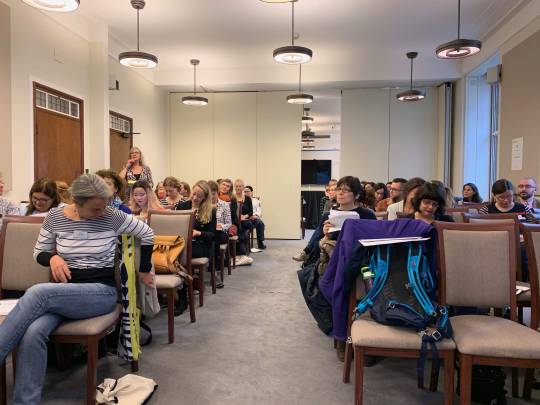
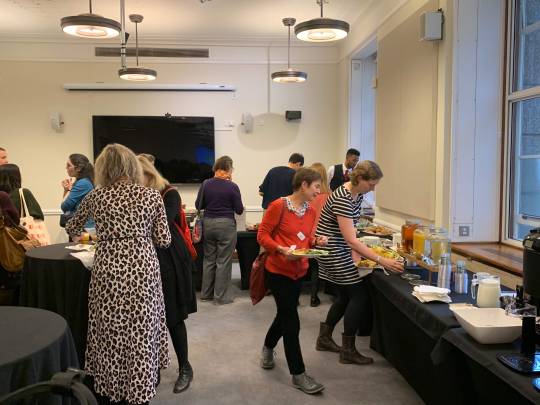
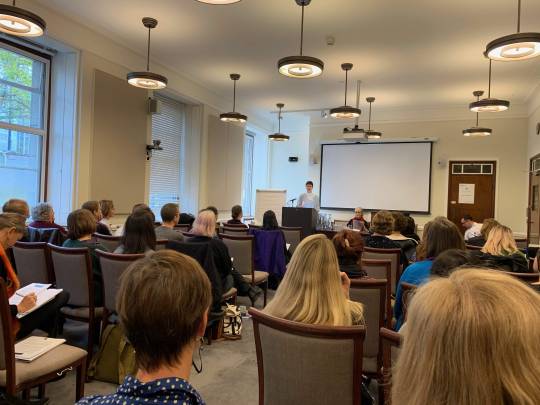
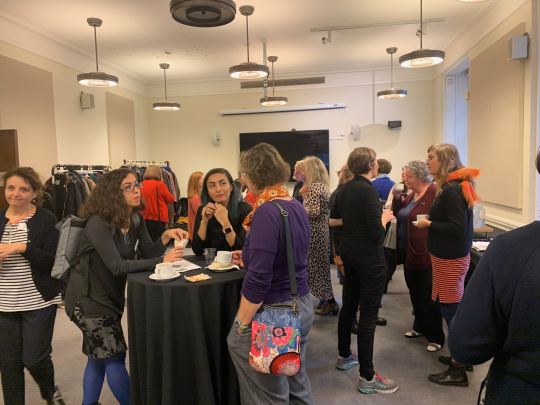
Part I
Being a WiT activist can take you to some extraordinary places. In my case, to Senate House, University of London, in the heart of Bloomsbury and right across from the British Museum, for the first-ever conference devoted to women, translation and literary publishing: “Translating Women: Breaking Borders and Building Bridges in the English-Language Book Industry,” organized by the #WiT activists and scholars Helen Vasallo (U Exeter) and Olga Castro (U Warwick) and hosted by The Institute for Modern Languages Research. As the keynote speaker I had the immense pleasure of kicking the conference off for the over 70 attendees in a talk I called “Snap! The Whys and Hows of Women in Translation”— “Snap!” being philosopher Sara Ahmed’s term in Living a Feminist Life for that critical moment, that pressure point, that can be the start of a pushback. I recounted how Alison Anderson’s posting on Words Without Borders in May, 2013, “Where Are the Women in Translation?” jolted many translators out of our complacent sense that all was forward-thinking and good in the Republic of Translated Literature. Anderson was the first to point out in print the significant gender imbalance in translation. Following the lead of VIDA: Women in Literary Arts, she used the 3% Database (set up in 2008 by Chad Post of Open Letter Books, and now housed at Publishers Weekly) to establish that only 26% of the books of fiction or poetry in translation published in the US were by women. She also pointed to the near-invisibility of women authors in translation on literary prize longlists and shortlists and to their near-absence as prizewinners, singling out the International Foreign Fiction Prize as what I’d call an especially noxious bastion of male dominance—only 2 women writers won in its 17 or so years of existence. That was Anderson’s Snap! moment. Mine was to follow.
With Anderson’s article in mind, I used the same freely available dataset to see how the biggest publishers of translations fared when gender of the author was taken into consideration. In other words, doing the full VIDA Count, but breaking out these variables: gender by original language, by country of origin, and by US publishers of translations. (Blogger and tweeter extraordinaire Meytal Radzinski—aka @bibliobio @ReadWIT—had also been crunching the same database, and came out with similar results.)
With respect to US publishers, in the most extreme case, I saw that in 2014 Dalkey Archive Press and its legendary editor John O’Brien had published not one single woman author out of its 30 titles in translation that year. Mr. O’Brien: What kind of enlightened and innovative editorial vision is that? A further offense: my tax dollars have gone into funding the NEA, a major grant-provider for your sexist press. Snap!
Did the negative publicity around this outrageous disparity nudge Dalkey into the 21st century? I’ve noticed that their list now never fails to include some women in translation (but nothing close to parity)—perhaps a concession to the threat of government funding—a lifeblood for non-profit presses—being denied.
To underscore, I speak from the perspective of a translator. It’s a rough terrain out there. Translation gigs are extremely competitive and one feels some pressure as a translator to “make nice” to publishers in the insular world of English-language literary publishing in order to stay in the game.
Nevertheless—persistence!
The provocations I ended my talk with are:
— When you write articles or speak on translation, cite women. Click here for a bibliography in progress of book-length works or essays on translation authored by women. It’s a list that incorporates many recommendations made by my translator colleagues.
—Question and challenge canons. I’d like to drop the idea of a “canon’ once and for all. It’s an example of adopting the master’s tools to dismantle the master’s house (in Audre Lorde’s terms). Delegitimize the notion of a canon.
—Don’t become a marketing tool for publishers.
—Watch out for “women in translation light,” for example, holding a reading under that banner but not talking about gender and other imbalances in translation. It will soon turn into an empty slogan.
I’m deeply grateful to Helen and Olga for inviting me to do the keynote—an enormous privilege—and I hope it helped set the stage for the wide spectrum of presentations and dialogues that followed over the next two days, a report on which is TK….
[End of part I of “Notes from the “Translating Women” conference.]
Margaret Carson
#TWConf19#helen vasallo#olga castro#sara ahmed#Senate House#WiT#Alison Anderson#Snap!#meytal radzinski
1 note
·
View note
Photo
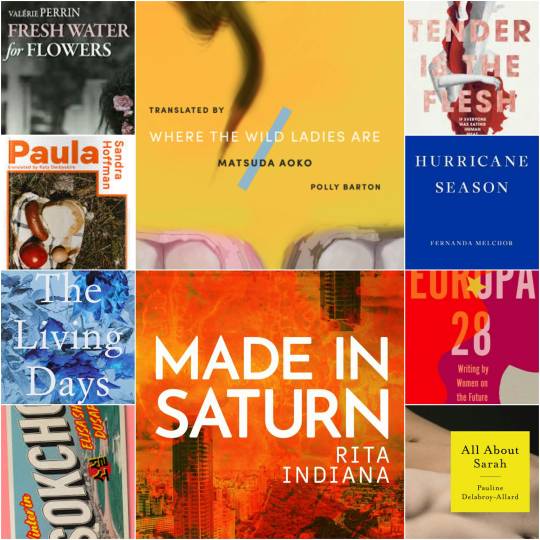
Check out Helen Vasallo's "20 books to watch out for in 2020" on her essential Translating Women blog:
"From dystopian alternate realities and speculative fiction to a feminist retelling of ghost stories and wickedly wry reflections on modern life, this is an eclectic and exhilarating mix of personal and political literature that includes novels, short stories, fiction, memoir, autofiction and speculative fiction. Dive in and enjoy!"
3 notes
·
View notes
Quote
Some of us have a platform from which to talk about this, but the real shift will come from readers. If sales and reviews of women’s writing in translation increase, the publishing industry will respond.
Helen Vasallo in Plume Interviews.
#helen vasallo#translating women#university of exeter#witmonth2019#womenintranslation#TranslatingWomenconference
3 notes
·
View notes
Photo
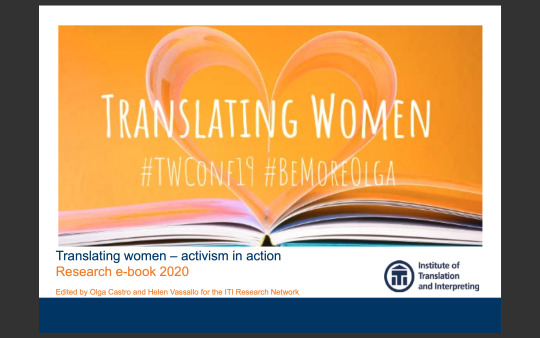
A WiT milestone! Translating Women -- Activism in Action, a compilation of the papers presented at the inaugural Translating Women Conference Oct. 31-Nov. 1, 2019, is just out as an ebook from the ITI-Institute of Translation and Interpreting (free registration needed to download). Kudos to Olga Castro and Helen Vasallo, the conference organizers, for going the extra mile of co-editing this volume!
Am honored to be published alongside fellow WiT advocates Rosalind Harvey, Corine Tachtiris, Aviya Kushner, Muireann Maguire, Șule Akdogan and Oisin Harris. My keynote, “Snap! Or the Whys and Hows of Women in Translation,” in which I share my thoughts about the origins of the Women in Translation movement, address some of the resistances faced, and talk about ways of “snapping the gap,” is posted here. —Margaret, August 5, 2020.
#Translating Women confererence#Translating Women - Activism in Action#Institute of Translation and Interpreting#Be More Olga#twconf19
2 notes
·
View notes
Text
#WiT Goes to Senate House, Part I
Notes from the “Translating Women” Conference
31 Oct. - 1 Nov. 2019
Part I
Being a WiT activist can take you to some extraordinary places. In my case, to Senate House, University of London, in the heart of Bloomsbury and right across from the British Museum, for the first-ever conference devoted to women, translation and literary publishing: “Translating Women: Breaking Borders and Building Bridges in the English-Language Book Industry,” organized by the #WiT activists and scholars Helen Vasallo (U Exeter) and Olga Castro (U Warwick). As the keynote speaker I had the immense pleasure of kicking the conference off for the over 70 attendees in a talk I called “Snap! The Whys and Hows of Women in Translation”— “Snap!” being philosopher Sara Ahmed’s term in Living a Feminist Life for that critical moment, that pressure point, that can be the start of a pushback. I recounted how Alison Anderson’s posting on Words Without Borders in May, 2013, “Where Are the Women in Translation?” jolted many translators out of our complacent sense that all was forward-thinking and good in the Republic of Translated Literature. Anderson was the first to point out in public, in print, the significant gender imbalance in translation. Following the lead of VIDA: Women in Literary Arts, she used the 3% Database (set up in 2008 by Chad Post of Open Letter Books, and now housed at Publishers Weekly) to establish that only 26% of the books of fiction or poetry in translation published in the US were by women. She also pointed to the near-invisiblity of women authors in translation on literary prize longlists and shortlists and to their near-absence as prizewinners, singling out the International Foreign Fiction Prize as what I’d call an especially noxious bastion of male dominance—only 2 women writers won in its 17 or so years of existence. That was Anderson’s Snap! moment. Mine was to follow.
With Anderson’s article in mind, I used the same freely available dataset to see how the biggest publishers of translations fared when gender of the author was taken into consideration. In other words, doing the full VIDA Count, but on publishers of translations, not on literary magazines or journals.
In the most extreme case, I saw that in 2014 Dalkey Archive Press and its legendary editor John O’Brien had published not one single woman author out of its 30 titles in translation that year. Mr. O’Brien: What kind of enlightened and innovative editorial vision is that? A further offense: my tax dollars have gone into funding the NEA, a major grant-provider for your sexist press. Snap!
Did the negative publicity around this outrageous disparity nudge Dalkey into the 21st century? I’ve noticed that their list now never fails to include some women in translation (but nothing close to parity)—perhaps a concession to the threat of government funding—a lifeblood for non-profit presses—being denied.
To underscore, I speak from the perspective of a translator. It’s a rough terrain out there. Translation gigs are extremely competitive and one feels some pressure as a translator to “make nice” to publishers in the insular world of English-language literary publishing in order to stay in the game.
Nevertheless—persistence!
The provocations I ended my talk with are:
— When you write articles or speak on translation, cite women. Click here for a bibliography in progress of book-length works or essays on translation authored by women. It’s a list that incorporates many recommendations made by my translator colleagues.
—Question and challenge canons. Why talk about “new” canons, “corrective” canons, “anti-patriarchal” canons, “amplifying” canons? I’d drop the idea of a “canon’ once and for all. It’s an example of adopting the master’s tools to dismantle the master’s house (in Audre Lorde’s terms). Delegitimize the notion of a canon.
—Don’t become a marketing shill for publishers.
—Watch out for “women in translation light,” for example, holding a reading under that banner but not talking about gender and other imbalances in translation. It will soon turn into an empty slogan.
I’m deeply grateful to Helen and Olga for inviting me to do the keynote—an immense privilege—and I hope it helped set the stage for the wide spectrum of presentations and dialogues that followed over the next two days, a report on which is TK….
—Margaret Carson
2 notes
·
View notes